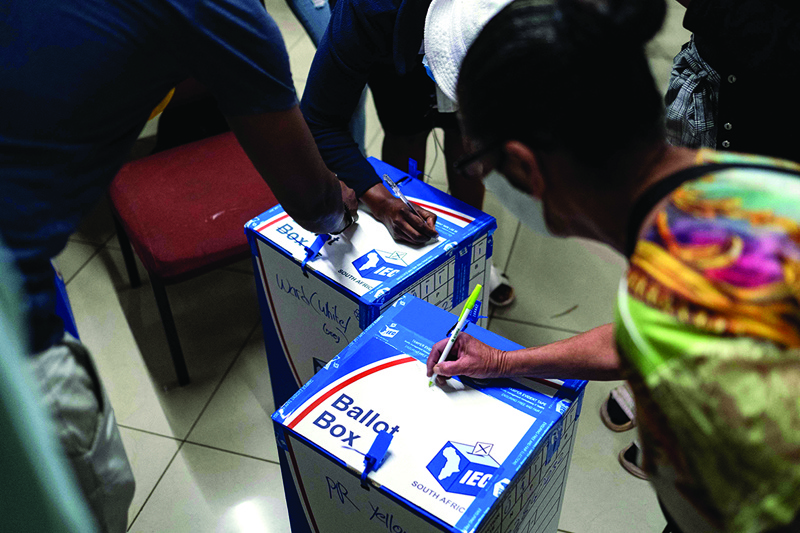 JOHANNESBURG: Party delegates sign the ballot boxes after supervising an electoral commission official sealing them at the Fordsburg Primary school polling station under the supervision of party delegates in Johannesburg. - AFP
JOHANNESBURG: Party delegates sign the ballot boxes after supervising an electoral commission official sealing them at the Fordsburg Primary school polling station under the supervision of party delegates in Johannesburg. - AFP
JOHANNESBURG: South Africa entered new political territory yesterday with the ruling African National Congress on the verge of losing its dominance and suffering its worst electoral setback in history. With 99 percent of the results from Monday's municipal elections published by the electoral commission, the ANC had taken 45.64 percent of the total votes cast nationally.
It is the first time the party of Nelson Mandela has received less than half of ballots cast in any election in the continent's most industrialized nation. But party officials put on a brave face. "The worst could have happened," ANC elections chief Fikile Mbalula told reporters. "We fought very hard to get to this point". He was adamant "we are not politically obliterated, we are not annihilated, that could have happened". The immediate impact of Monday's voting is local, as parties set about horse-trading to build coalitions in towns and cities.
Looking ahead to general elections in 2024, the results portend badly for the ANC. The local polls also set the stage for the country's evolution into a richer multi-party democracy, moving past the dream of a "rainbow nation" and into the reality of balancing myriad competing interests. "For some time, we've been trying to implement democracy in South Africa, but we have not really succeeded up to now to have a truly competitive multi-party democracy," said Sandile Swana, an independent political analyst.
Missing voters
Major cities such as Johannesburg and Pretoria have had coalition governments since the last local polls five years ago. The trend continues. Nationally, the ANC lost a majority in even more regions, including in eThekwini metro in former president Jacob Zuma's stronghold province of KwaZulu-Natal province. Only two out of three potential voters registered. Of those, less than half actually cast ballots.
For the first time, the ANC was in trouble and they couldn't hide the fact that they were scared. It's hard to remember now, but in the first democratic elections in 1994, the ANC's dominance was far from assured. But after Mandela ascended to the presidency, the party expanded its electoral success over the next decade until it controlled almost all major cities, and held a super-majority in parliament.
However, over the last 15 years, the ANC's popularity has declined sharply. Now dipping below the 50 percent mark for the first time, the ANC no longer appears invulnerable. "It's a psychological barrier, and now it's same for national election," said William Gumede of the Democracy Works think tank. After 27 years in power, the ANC has no one to blame for South Africa's woes. Unemployment, always stubbornly high, has hit a record 34.4 percent. Mismanagement and corruption have left the country unable to guarantee a steady electricity supply. Water cuts and sewage leaks are common. - AFP

